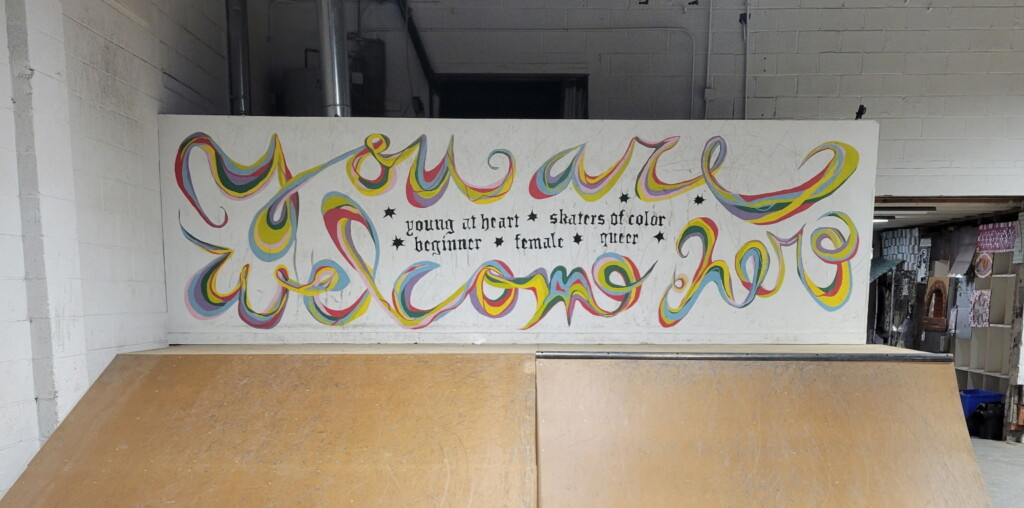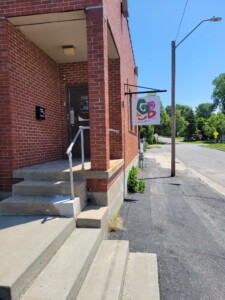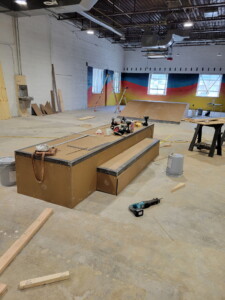Joan and Harper Rose don’t care if you can kickflip or not. They just want you to be cool, be safe have a good time, and feel comfortable digging into the unknown. In their three-year run, Goofball Sk8boards hosted community events that featured skaters of all levels, local advocacy groups, and local musicians. But that will soon come to an end. By Nov. 1, their doors will shut for good.
Skate culture is rooted in rebellion—When you have wheels, the world becomes your playground. “No skating” signs be damned! But, with its anti-authoritarian nature comes the macho and cliquey spirit of the young men that tend to dominate the scene. Pointing and laughing at newcomers, substance use, and arrogant taunting that so many skaters partake in is enough to lead those taking on the sport for the first time—young women especially—to feel isolated from the wider culture of skating. The Roses, as longtime skaters, felt this ostracization firsthand and devoted years of their lives to subverting the already-subversive art of skating by creating a space that fosters talent and tinkering alike.
After coming into some unexpected money, the Roses’ instinct was to give back to the scene they love. Joan says their thought at the time was, We could invest our money, or we could build a skate park for all our friends, and for anyone who felt unwelcomed by the skate scene.
So they decided to invest in the future of this culture, choosing community over their financial future, that would benefit their whole community. With their own experiences as feminine and gender nonconforming beginner skaters at the front of their minds, they found a warehouse space in Waldo tucked between Wornall and Brookside, built some ramps by hand, and opened the park. According to Joan, a large part of making their space beginner-friendly and welcoming as possible was “setting the tone” with a little artfulness and whimsy in their presentation.
“Our friend [Celina Curry] painted the shop, Harper’s dad Tim cut out those skateboards in the wall… so I feel like there’s this very friendly, inclusive vibe, for kids and everyone, to the point where it’d be weird to be showing off here,” recalls Joan. “‘Cause this is supposed to be a fun, no-pressure place.”
The Roses offered skate workshops for all ages and experience levels, provided boards and pads for people to try things out before spending money on gear, and enforced a 100% sober space policy.
“If you can’t skate and not also catch a buzz, there are so many other parks you can go do that at,” Harper says. “You can take your buzz somewhere else. But we want you to come back sober. We want you to try again.”
As Goofball Sk8boards set down roots and connected with the wider community, they found ways to give back that go deeper than a friendly sober space for skaters. They implemented a donations-based “free skate” model, with the goal of making their park 100% free and accessible to anyone who wants to drop in and roll around.
They engaged more deeply beyond skating by facilitating a physical space for local groups to gather, teach, and give back. Their back rooms hosted a number of organizations, including Sunrise Movement, Decarcerate KC, the Neither/nor Zine Distro, and a food pantry stocked by KC Mutual Aid.
From providing young girls their first skateboards, to hosting KC Zine Con and queer hardcore legends The HIRS Collective, the couple fearlessly tried things out and moved in a way that reinforced their belief that if you want to see meaningful change, it will not come from the top down—It must be sparked at a local level, by you, wherever your feet are.
When discussing their work and mission, there was not a drop of ego or nobility to be found, but rather a longing to give back and create something where there was once nothing.
Joan says there was some reluctance to label the park as “The Trans Skate Park”, simply because they don’t want it to be a one-and-done initiative. They want more community members to take action and pave the way for more locations like these to exist within the community.
“If we market ourselves as the queer skate place, people will say, ‘Oh it’s done, it already exists,’” and not take initiative to build communities of their own.
To that point, Joan says, “We’re all still here. There was queer skating before Goofball, and there will continue to be going forward. Our skaters are talking about planning skate meetups again at local parks to emphasize that nothing is dead and gone, it’s just another chapter.”
They emphasized that we can’t sit on our hands and wait for the world we want to be built by others and that—even without the startup capital to sign a lease—public parks and libraries have resources available for projects of all kinds. There is always more room to build, and constructing the kind of interconnected and mutually beneficial world we yearn for will take all of us.
“Goofball is closing, but I don’t feel like we failed in any way,” Joan says. “A great Jewish saying I really resonate with is, ‘You don’t have to finish the work, but you are not free to desist from it.’”
Goofball Sk8boards hosts the AKCAB Anarchist Book Fair on Saturday, Oct. 25. Details on that event can be found here. You can visit the shop to buy discounted gear, items from their back rooms, and skate ramps before Goofball closes their doors at the end of the month.








